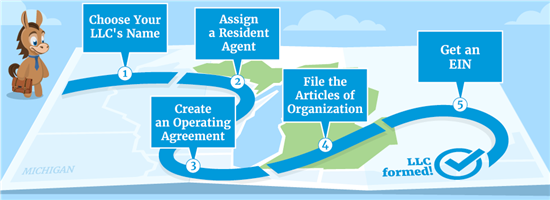How to Start an LLC in Michigan
Creating an LLC in Michigan doesn't have to be complicated. There are different ways to do it. Read on to learn how.
 |
Thinking about working on legal papers can seem daunting.
Not to mention, the process of starting an LLC in Michigan can differ with other states.
How do you actually start? What are the requirements? Can someone else do it for you?
Yes to the last question. We'll discuss the answers to the first two as well. Read on.
How to Create an LLC in Michigan
 |
The formation process in every state is usually similar. But some aspects can differ depending on where your business is.
Here's a quick guide on how it works in Michigan:
Choose your LLC name
Like in most states, you need to register a business name. You generally have more options for LLC names than sole proprietorships and partnerships.
But whatever you choose, it still has to adhere to the state's naming guidelines.
Here's a list of what they require:
- It should contain words that indicate that it's an LLC. You need to add terms like "LLC" or "Limited Liability Company" to your preferred business name.
- It must be unique and not similar to another company's name. You can't use it if another business has already registered it. You should also avoid those that are too similar to an existing business' name.
You also can't use articles, suffixes, numbers, etc., to create a distinction.
- It can't imply a purpose other than what's registered.
- It shouldn't imply an association with any state or federal government agency/organization.
You can read about Michigan's Limited Liability Company Act to learn more about their name restrictions.
You can check if your chosen business name is still available by going to Michigan's Business Entity Search. It'll show if another company has already registered your preferred business name.
While following the state guidelines is important, it's not the only factor involved when deciding on an LLC name. Here's what else you should consider:
Make it domain-friendly.
Checking if your LLC name is also available as a domain name before filing your Articles of Organization is a good idea. Even if you're not planning on creating a website anytime soon.
Doing so will allow you to secure the URL before anyone else does. That way, you don't end up with a domain name that's far from your actual business name. And customers can easily find your website when it's finally up and running.
Choose something meaningful, original, and memorable.
Your business name should convey what your business is all about and can immediately be associated with your company. All while also being easy enough for customers to recall.
One of the best ways to achieve the last one is by keeping it simple. The easier it is to spell and pronounce your LLC name, the easier it'll be for your customers to remember it.
Let's say you have a business name in mind. What if you're not sure about it yet?
Can you reserve a name for your Michigan LLC?
Yes, you can reserve an LLC name if you're still pondering on it. You just have to file an Application for Reservation of Name and pay the $25 filing fee for LLCs.
Keep in mind that business name reservations last 6 months after filing. But you can re-file the form and repay the fee if you want to renew your reservation.
Now, what about that "other" name you have in mind?
Can a LLC have a DBA in Michigan?
Yes, you can get a DBA or assumed name if you want more flexibility with your business name. For example, a DBA can come in handy for marketing campaigns or company logos.
To register a DBA in Michigan, you need to file a Certificate of Assumed Name and pay the appropriate filing fee. For LLCs, this costs $25 per filing.
Assumed names/DBAs last 5 years in Michigan. You need to re-register it if you want to continue using it after it expires.
Assign a resident agent
All Michigan LLCs need to list a resident agent (aka registered agent) in their formation documents to be approved.
Resident or registered agents serve as your company's initial point of contact. They receive important documents like legal documents, government notices, and tax forms on behalf of the business. And then forward these documents to whoever's in charge of them within the company.
Who can be a resident/registered agent in Michigan?
You have several options for your resident or registered agent. You can be your own, assign someone else, or hire a registered agent service. The last one is the easiest and most convenient option.
That said, whoever you choose as your resident agent needs to meet the following criteria:
- At least 18 years old
- Have a physical street address within the state (no P.O. Boxes or virtual addresses)
- A Michigan resident or resides within the state (for individuals)
- Allowed to conduct business in Michigan (for businesses)
- Always readily available during regular business hours
You can still change your listed resident agent after you've formed your LLC. To do this, just file a Certificate of Change of Registered Agent and pay the $5 filing fee.
Yes, but most advise against it. For one, your information, like your name and street address, will become part of the public record. And you need to be always available during regular business hours to receive documents.
Create an operating agreement
Technically, Michigan doesn't require LLCs to have an operating agreement. But having one can come in handy, especially when conflicts arise within the business.
Since it's optional for Michigan LLCs, you don't have to file it with the state when you submit the formation documents. You can just keep it with your company records.
You can draft an operating agreement yourself or have a third party create one for you. The second option usually costs extra.
What is an LLC operating agreement?
An operating agreement details everything about your LLC's operations and establishes its ground rules. That includes how decisions are made within the company.
Without an operating agreement, your LLC will be subject to the state's default laws and regulations. And the results may not always be favorable for your business.
What can I include in an operating agreement?
Michigan doesn't have strict rules on what you can include in an LLC operating agreement. You can add any provisions you want as long as it still complies with the state's laws and regulations.
To give you an idea, here's what LLC owners usually include in one:
- Voting rights and responsibilities
- Members' ownership percentages
- Distribution of profits and losses among members
- Management structure (member- or manager-managed)
- Dissolution and ownership transfer rules
It should also include information about your LLC, like its name, business purpose, effective date, duration, and registered agent details (name and registered address).
A member-managed LLC means that the LLC owners will handle the company's management themselves, including overseeing its day-to-day operations. While a manager-managed LLC means they delegate these tasks to someone else.
File the Articles of Organization
To start an LLC in Michigan, you need to file your Articles of Organization with the state's Department of Licensing and Regulatory Affairs.
The easiest and quickest way to form your Michigan LLC is by submitting your Articles of Organization through the state's online platform, LARA.
Here's how to do it:
- Choose the right form from the list.
- Input the requested information about your business (LLC name, resident agent, business purpose, etc.).
- Fill in your contact information.
- Pick your preferred processing time (standard or expedited).
- Check if the details are all correct then submit the form.
You can also file your Articles of Organization by mail or drop them off in person. Here's where to send them:
- By mail:
Michigan Department of Licensing and Regulatory Affairs
Corporations, Securities & Commercial Licensing Bureau - Corporations Division
P.O. Box 30054
Lansing, MI 48909 - In-person:
Michigan Department of Licensing and Regulatory Affairs
2501 Woodlake Circle
Okemos, MI
If you're dropping the documents off in person, you can do so from 8 AM to 5 PM every day from Monday to Friday (except holidays).
You also need to pay the state filing fee when you file the formation documents. This costs $50 per filing in Michigan. After that, you just have to wait until your registration is approved.
The average processing time for Michigan LLC applications is around 10 to 15 business days. In some cases, it can take as long as 6 weeks. You can opt for expedited processing. But it costs an extra $50 to $1,000, depending on how quickly you want it done.
Get an EIN
Once you've formed your Michigan LLC, you can apply for an Employer Identification Number (EIN). If your company is a multi-member LLC, you'll need one for tax purposes.
Single-member LLCs can still use the owners' Social Security numbers (SSNs) as their EIN.[1] But getting a separate EIN to distinguish your company's finances from your personal assets is still better.
You can apply for an EIN directly with the IRS or through third-party services. Direct applications cost nothing, but third-party companies may charge you for this service.
You still need to apply for a new EIN because the IRS requires it when changing business structures.[2]
After creating an LLC, you might think you're done with all the paperwork. Unfortunately, that's not the case.
What to Do After Starting an LLC in Michigan
There are a few things you need to do to keep your company in good standing. These are requirements from the government.
File your annual report.
All Michigan LLCs have to file an Annual Statement after their registration is approved. The state department sends a pre-printed copy of the form to the company's assigned resident agent around 90 days before the due date.
Keep in mind that all LLCs must file their Annual Statement by February 15 of each year. The exception is new LLCs formed after September 30, which are not required to file in the year following their formation.
You can file it online, by mail, or in person along with the filing fee. It costs $25 per filing for standard LLCs. Professional LLCs must pay a filing fee of $75, with a $50 penalty fee for late submissions and payments.[3]
Failure to file your LLC's Annual Statement will result in your company losing its good standing with the government. You'll need to file a Certificate of Restoration of Good Standing and pay the $50 filing fee to restore it.
Get the required permits and licenses.
In Michigan, LLCs don't need a general business license to do business within the state. But some municipalities may require them if you want to do business in their jurisdiction.
You may also need specific business licenses and permits depending on your industry or business activities. You can check Michigan's online database to see what business licenses or permits your company needs to operate.
File and pay taxes.
Unlike corporations, Michigan LLCs are not required to pay income taxes as separate legal entities. They enjoy pass-through taxation. Members just need to file and pay income taxes on the company's earnings as part of their personal tax returns.
The standard income tax rate in Michigan is 4.25%. But if LLCs choose a C-corporation tax status, they'll need to pay the corporate tax rate of 6% instead.
Aside from income taxes, other taxes your LLC might be subjected to are:
- Sales tax (if you sell taxable goods and services)
- Employer tax (if you have employees)
- Self-employment tax (unless you're taxed as a C- or S-corporation)
Separate your personal and business finances.
Having a separate business bank account is crucial for an LLC. Not only will it allow you to keep better track of your business expenses, but it'll also strengthen your company's liability protection.
It can prepare you for any questions regarding your business's financial records. You can easily prove you're not personally using company funds. Not to mention, it's easier to open a business bank account if you've already formed an LLC.
Get business insurance.
Michigan's state law doesn't require LLCs to get business insurance, except workers' compensation for employers. However, it's still a good idea to get it for your business.
That's because an LLC only prevents your personal assets from being used as payment for the company's debts and other liabilities. It doesn't cover its financial losses, unlike business insurance.
There are several types available, with the most common ones being general liability, professional liability, and commercial property insurance. You can also combine several types into one comprehensive policy, like a Business Owner's Policy (BOP).
3 Ways to Start a Michigan LLC
Choosing to process paperwork yourself has its perks. But you can also leave it to someone else such as a lawyer or an LLC service.
You can weigh out your options below.
Do it yourself
This is the easiest and simplest way to start an LLC in Michigan. It's a great option if your formation needs are straightforward. You could be creating an LLC with few members and employees in only one state, for example.
It's also the least expensive option. There's no need to pay for anything else besides the filing fees. But it's not the most convenient option. It also wouldn't be the best choice if you need to start multiple LLCs in various states.
You can start 3 types of LLCs in Michigan: domestic, foreign, and professional LLCs. All of these can be single-member or multi-member LLCs.
Hire a lawyer
Working with an attorney is best if you need someone with in-depth knowledge of Michigan's business laws and regulations. They can provide comprehensive legal assistance, including drafting your LLC's paperwork and other legal documents.
However, the legal fees can get very expensive. Even more so if they need to handle something complex. It's not a suitable option if you have a limited budget.
Get help from a formation company
An LLC service can handle every step of the process for you. You wouldn't need to do anything besides provide information about your business. They offer convenience without costing a fortune.
Most also offer multiple business services (i.e., registered agents, annual filing, and EIN applications). You could say it's a good all-in-one option.
One downside is that some charge for services that are generally free. For example, applying for an EIN doesn't have to cost you. But a formation company might charge you for it. It's best to budget how much you're paying for convenience.
Benefits of Starting a Michigan LLC
A limited liability company isn't the only business structure you can create in Michigan. But it can be a good option if you want to take the next step for your business.
Here are some of the perks you get with a Michigan LLC:
- Personal liability protection
An LLC is considered its own legal entity, so its assets and liabilities are entirely separate from your personal ones.You can take more business risks without worrying about losing your personal assets if these risks don't work out. That's not something you get as a sole proprietorship or partnership.
- Pass-through taxation
LLCs are also disregarded entities by default, so their business income taxes are filed and paid as part of the LLC members' personal tax returns. No need to pay corporate taxes, unless you choose a C-Corporation tax status. - Minimal red tape
An LLC gives you liability protection but with fewer ongoing requirements than a corporation. Usually, you just need to submit an annual report and keep your business finances well-organized with a separate bank account.Meanwhile, corporations need to hold annual shareholders' meetings, elect a board of directors, create company by-laws, and practice strict recordkeeping.
But there are drawbacks as well. For one, you can't sell company stocks or shares to raise capital. If you need additional funding for your business, you'll have to get it through other means, like grants or business loans.
LLC members also need to pay self-employment taxes since they're not considered company employees. You have to choose a C- or S-Corporation tax classification to become exempt.
What the Experts Say
CreditDonkey asked a panel of industry experts to answer readers' most pressing questions. Here's what they said:
Bottom Line
Starting an LLC in Michigan doesn't have to be so complicated. You can get it done in 5 steps.
Just choose an LLC name and assign a resident agent. The operating agreement is optional but can come in handy. Then you'll just have to file the Articles of Organization and get an EIN.
You can do it all yourself or hire someone else. The latter can make it more convenient but costly.
References
- ^ Internal Revenue Service. Single Member Limited Liability Companies, Retrieved 05/09/2024
- ^ Internal Revenue Service. Do You Need an EIN?, Retrieved 05/09/2024
- ^ Michigan Department of Licensing and Regulatory Affairs. Limited Liability Company State Filing Information, Retrieved 05/09/2024
Write to Alyssa Supetran at feedback@creditdonkey.com. Follow us on Twitter and Facebook for our latest posts.
|
|
| ||||||
|
|
|







